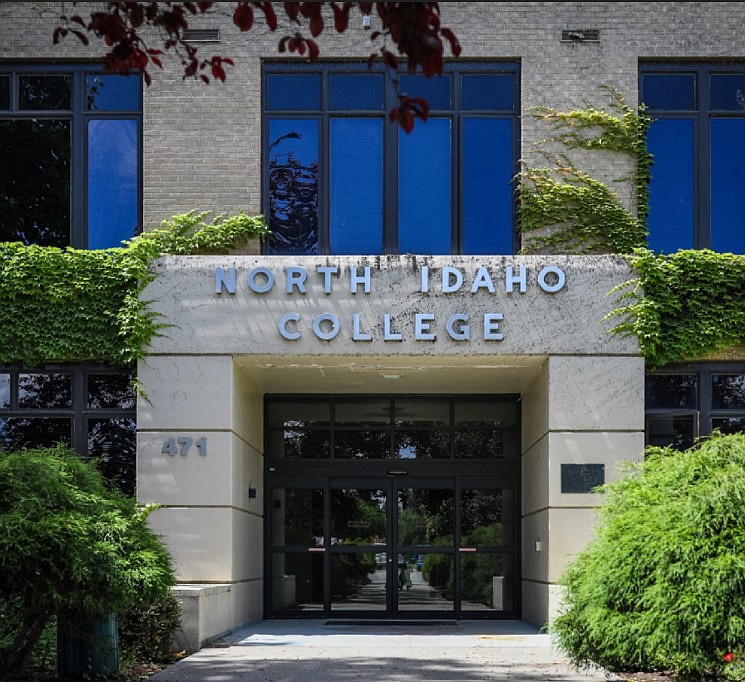Charting new waters, North Idaho College prepares for life without accreditation
COEUR d’ALENE — North Idaho College trustees agreed this week on how to prepare for a worst-case scenario where the college loses accreditation next spring, though administrators are optimistic it won’t come to that.
Since last February, NIC has operated under a show-cause sanction issued by its accreditor, the Northwest Commission on Colleges and Universities. Show cause is the last step before loss of accreditation.
NIC was not sanctioned because of problems with finances or academics, as is usually the case for colleges facing loss of accreditation, but rather because of board governance issues stretching back to 2020.
“The board, overall, is heading in a better direction now,” NIC President Nick Swayne said Friday. “I think we’re getting to be back on track.”
Indeed, NIC has addressed several of the problems outlined by the NWCCU. Interim President Greg South’s 18-month contract expired June 30, leaving the college with only one president, as the commission recommended. NIC has also resolved multiple lawsuits, including the Supreme Court appeal of Swayne’s reinstatement that trustees voted 4-1 to drop.
Some areas of concern remain. For example, the board must “resolve the issues underpinning all no-confidence votes” from staff and students and “demonstrate a willingness to work with and support faculty, staff and students when their concerns are communicated.”
Federal regulations stipulate that NIC has until April 1, 2025, to return to good standing. If the college has not done so by that deadline, the NWCCU will be required to withdraw accreditation.
Given the progress made so far, Swayne said he’s optimistic.
“We are in a much better place now than we have been in the past,” he said.
If NIC loses accreditation, it’s unclear what would happen next. Idaho law provides no framework for how to manage the loss of accreditation; it has never happened in this state.
“We are in a situation right now that is unprecedented,” Trustee Brad Corkill said Friday. “There’s no road map for us to follow. We are under teach-out entirely because of board behavior.”
During a special meeting Tuesday, trustees considered what options will be available if accreditation is lost.
Federal regulations require NIC to negotiate formal “teach-out” agreements with other institutions, which would enable currently enrolled students to complete their degrees elsewhere. No new students could enroll. After the teach-out agreements are executed, the college would close.
NIC could reapply for accreditation after two years, but the college would effectively start over from scratch.
“This option here really results in the permanent closure or demise of NIC,” Steve Kurtz, NIC’s accreditation liaison officer, told trustees Tuesday.
Swayne noted that implementing teach-out agreements would be burdensome for students, requiring them to commute or relocate to another campus or take only online classes.
“That just isn’t practical in Idaho,” he said.
Another possibility is for NIC to ask accreditors and the federal government to temporarily place NIC under the control of another accredited institution. Course offerings and student services would remain the same.
“This will allow the college time for us to regain status as a separate, accredited entity,” Kurtz said. “This is the least disruptive (option). Currently enrolled students, in this case, we would do our best to make sure they don’t even feel the impact of the change.”
A final option, which trustees did not entertain, would be to take no further action. Such inaction would likely lead to immediate and permanent loss of accreditation.
“If we get our accreditation pulled, the only way that we can tell to really leave the community whole is by putting it at another school,” Trustee Mike Waggoner said Tuesday. “The issue is the local community loses control temporarily.”
Trustee Greg McKenzie expressed reservations about turning to the University of Idaho for temporary control and initially said he would prefer for NIC to execute teach-out agreements and then close permanently rather than operate under U of I’s authority.
Trustee Todd Banducci shared similar concerns.
“It just felt too convenient,” he said Tuesday. “It feels like there are folks that have driven us to this corner and then it’s put back on us trustees. ‘Well, if you blow up the college or kill the college, it’s on you.’ But no, we didn’t drive that bus.”
Banducci has previously cast blame for NIC’s accreditation woes on the joint regional human rights task forces that filed complaints with the NWCCU in 2021, citing numerous violations of the NWCCU’s eligibility requirements and NIC policy. After investigating the complaints, the commission went on to sanction NIC with a warning.
Trustees ultimately directed staff to prioritize creating an agreement for temporary control and to reach out to the College of Western Idaho, the College of Southern Idaho and Lewis-Clark State College for that purpose.
“I think, in the end, that was a really good perspective for the board to take,” Swayne said Friday.
Trustee Tarie Zimmerman agreed.
“In the worst-case scenario, (that option) appears to be really the only way to allow NIC to continue,” she told The Press. “I don’t know what that would look like for the board. But that option means the board is interested in preserving NIC.”
Swayne emphasized that neither the teach-out agreements nor any agreement for temporary control will go into action unless NIC loses accreditation.
“We’re really taking positive action to ensure that the failsafe doesn’t kick in,” he said.
The NWCCU’s next site visit to the North Idaho College campus is scheduled for Oct. 14 and 15.

